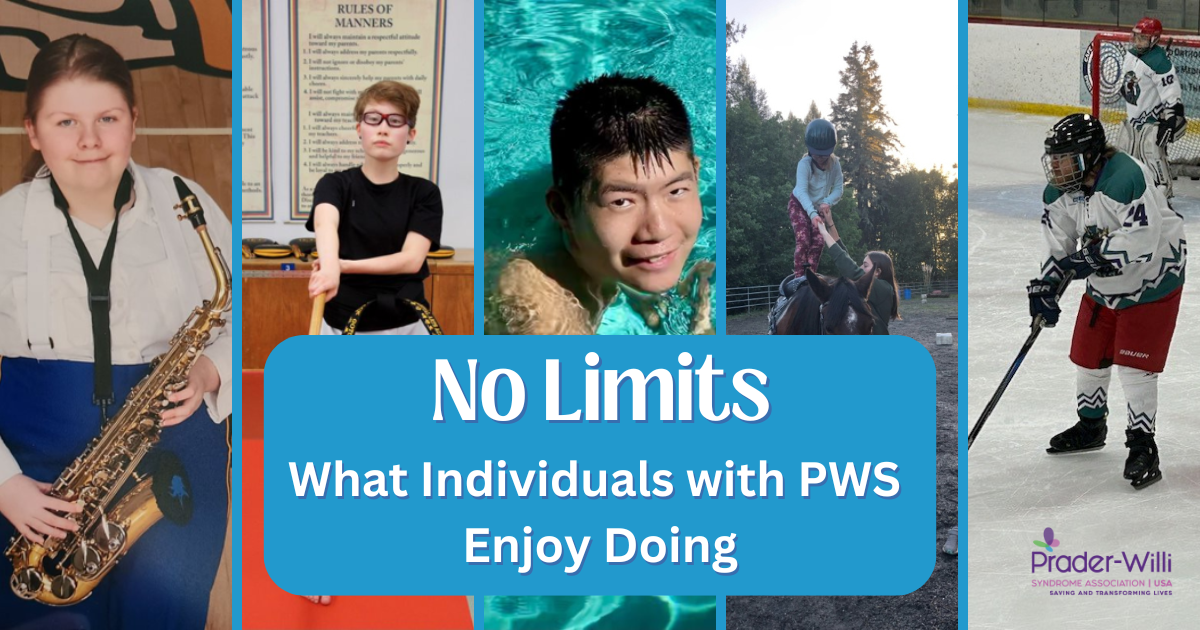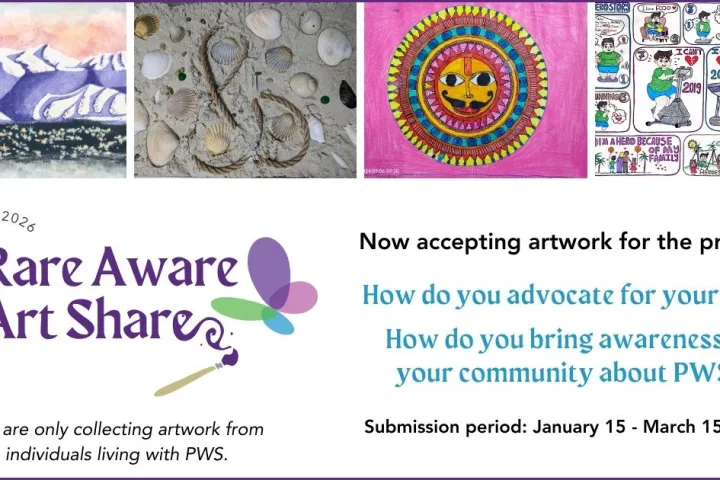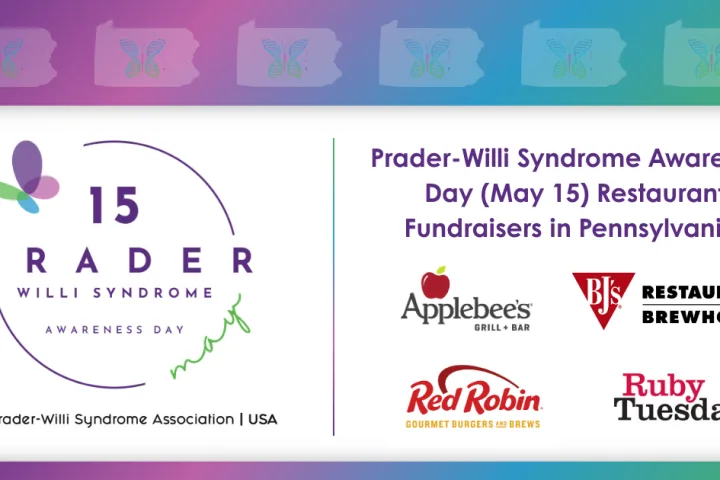When we receive a diagnosis of Prader-Willi syndrome, often we also receive a litany of “cannots” and “will nevers”. We may let ourselves dwell, even if momentarily, in that world of negatives and adventures never-to-be. We mourn the future we thought we once possessed, thought our loved one possessed. Some would argue it is part of the process, to say goodbye to those potential futures and let the pain of grief sharpen our edges and restructure our cells for cortisol spikes and battle-ready alertness, preparing us for a future of challenges and disappointments.
But the hopeful reality is that no future is ever decided, genetics intact or not. A diagnosis of PWS is merely a template our loved one’s lives are laid upon, not a road map etched into stone. With advances in research, potential treatment options, our understanding of how to manage food access and behavior, and the growing education of our communities, the lives of our loved ones look more promising by the hour. With the awareness and interaction capabilities social media affords us, we can see how varied and beautiful the lives of individuals with PWS are and can be. This alone should give parents and caregivers hope.
We reached out to our community, asking what activities your loved ones enjoy. In a world where so many of us are told what our children won’t be doing, let’s blow those speakers, dismantle those labeled barriers, and celebrate all the wonderful things they ARE doing!
Here are just some of the responses from our question, “What activities does your loved one with PWS enjoy doing?”
“Going to the park and down the slide. Loves playing and chasing our dog, Maya.”
“Playing soccer.”
“Coursework needed to apply for graduate school occupational therapy program.”
“Playing the guitar.”
“Archery club and getting the occasional bulls eye!”
“Swimming and gymnastics.”
“Bowling.”
“Playing doctor with her Build-a-Bears! She does oxygen and growth hormone shots on them too.”
“Basketball.”
“Walking in woods, swimming, digging in sand, climbing anything.”
“Singing with the choir.”
“Playing ice hockey!”
“Dancing and walking.”
“Camping! She is only 2 but she loves to be at the campground!”
“Everything music related.”
“Theatre school.”
“Puzzles and coloring apps and word games on her iPad.”
“Nature walks.”
“Jigsaw, colouring, ballet, and tap dance.”
“Walking her dog.”
“Cycling, swimming, puzzles, sticker by numbers,”
“Walking and volunteering at the horse rescue.”
“Anything with animals.”
“Scary Movies.”
This is a small list of all the many exciting and fulfilling activities individuals with PWS participate in. Whether you are a new parent, or a veteran caregiver, remember there is no limit to the joy our loved ones may find in life.
“The quality of our life is directly proportional to the quality of our thoughts.” – Avijeet Das
Share this!





 Perry A. Zirkel has written more than 1,500 publications on various aspects of school law, with an emphasis on legal issues in special education. He writes a regular column for NAESP’s Principal magazine and NASP’s Communiqué newsletter, and he did so previously for Phi Delta Kappan and Teaching Exceptional Children.
Perry A. Zirkel has written more than 1,500 publications on various aspects of school law, with an emphasis on legal issues in special education. He writes a regular column for NAESP’s Principal magazine and NASP’s Communiqué newsletter, and he did so previously for Phi Delta Kappan and Teaching Exceptional Children. Jennifer Bolander has been serving as a Special Education Specialist for PWSA (USA) since October of 2015. She is a graduate of John Carroll University and lives in Ohio with her husband Brad and daughters Kate (17), and Sophia (13) who was born with PWS.
Jennifer Bolander has been serving as a Special Education Specialist for PWSA (USA) since October of 2015. She is a graduate of John Carroll University and lives in Ohio with her husband Brad and daughters Kate (17), and Sophia (13) who was born with PWS. Dr. Amy McTighe is the PWS Program Manager and Inpatient Teacher at the Center for Prader-Willi Syndrome at the Children’s Institute of Pittsburgh. She graduated from Duquesne University receiving her Bachelor’s and Master’s degree in Education with a focus on elementary education, special education, and language arts.
Dr. Amy McTighe is the PWS Program Manager and Inpatient Teacher at the Center for Prader-Willi Syndrome at the Children’s Institute of Pittsburgh. She graduated from Duquesne University receiving her Bachelor’s and Master’s degree in Education with a focus on elementary education, special education, and language arts. Evan has worked with the Prader-Willi Syndrome Association (USA) since 2007 primarily as a Crisis Intervention and Family Support Counselor. Evans works with parents and schools to foster strong collaborative relationships and appropriate educational environments for students with PWS.
Evan has worked with the Prader-Willi Syndrome Association (USA) since 2007 primarily as a Crisis Intervention and Family Support Counselor. Evans works with parents and schools to foster strong collaborative relationships and appropriate educational environments for students with PWS. Staci Zimmerman works for Prader-Willi Syndrome Association of Colorado as an Individualized Education Program (IEP) consultant. Staci collaborates with the PWS multi-disciplinary clinic at the Children’s Hospital in Denver supporting families and school districts around the United States with their child’s Individual Educational Plan.
Staci Zimmerman works for Prader-Willi Syndrome Association of Colorado as an Individualized Education Program (IEP) consultant. Staci collaborates with the PWS multi-disciplinary clinic at the Children’s Hospital in Denver supporting families and school districts around the United States with their child’s Individual Educational Plan. Founded in 2001, SDLC is a non-profit legal services organization dedicated to protecting and advancing the legal rights of people with disabilities throughout the South. It partners with the Southern Poverty Law Center, Protection and Advocacy (P&A) programs, Legal Services Corporations (LSC) and disability organizations on major, systemic disability rights issues involving the Individuals with Disabilities Education Act (IDEA), Americans with Disabilities Act (ADA), and the federal Medicaid Act. Recently in November 2014, Jim retired.
Founded in 2001, SDLC is a non-profit legal services organization dedicated to protecting and advancing the legal rights of people with disabilities throughout the South. It partners with the Southern Poverty Law Center, Protection and Advocacy (P&A) programs, Legal Services Corporations (LSC) and disability organizations on major, systemic disability rights issues involving the Individuals with Disabilities Education Act (IDEA), Americans with Disabilities Act (ADA), and the federal Medicaid Act. Recently in November 2014, Jim retired.